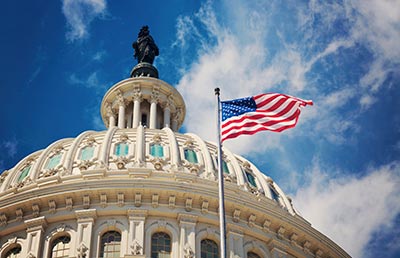$900 Billion Pandemic Relief Bill Awaits President’s Decision to Sign

This blog was authored by CLA’s Managing Principal of Financial Institutions, Charlie Cameron.
Bill Contains Important Extension of Forgivable PPP Loans for Small Businesses
After months of negotiations, an eleventh hour compromise of the third round of economic relief related to the COVID-19 pandemic has passed both the House and Senate. Although it was previously indicated that the President would sign the $900 billion package into law, late Tuesday (December 22, 2020), the President requested that Congress amend the bill to significantly increase the amount of direct stimulus checks to consumers.
Key PPP Provisions
Key provisions for lenders and small business borrowers include not only the extension of the Small Business Administration’s (“SBA”) Paycheck Protection Program (“PPP”), with $325 billion authorized for small business assistance, but also include multiple other important provisions for which small businesses have lobbied. These provisions include the following:
- New round of PPP lending—eligible borrowers:
- Fewer than 300 employees (increased to 500 employees for businesses with multiple locations)
- Must have reduction in gross receipts of at least 25 percent in any quarter in 2020 compared to the same quarter in 2019
- Must have been an operating business on February 15, 2020 and not traded on a national exchange
- New entity types are also eligible to participate in the PPP program, including 501(c)(6) and direct marketing organizations with limited lobbying activities
- Maximum loan is 2.5 times average monthly payroll up to $2 million. Certain entities under the NAICS code 72 such as restaurants and hospitality businesses can receive loans for 3.5 times average monthly payroll up to $2 million
- Maturity period of the loan is five (5) years and the rate is 1 percent.
- Eligible expenditures are expanded to include certain business operations costs, property damage costs, supplier costs, and COVID-19 worker protection costs such as expenditures related to drive-up and outdoor dining operations
- Eligible expenditures are tax deductible
Implementation of the extended PPP loan program is expected to occur soon. Under the bill, the SBA is charged with issuing regulations to carry of the provisions of the Act within ten days of the date of enactment.
Loan Forgiveness
The bill also includes a simplified loan forgiveness process for loans of $150,000 or less, whereby lenders can solely rely on the borrower’s certifications and not obtain supporting documents. PPP loans remain forgivable to the extent of eligible expenditures made during a borrower selected cover period ranging from 8 weeks to 24 weeks from the origination date of the loan. Payroll costs must comprise at least 60 percent of the forgivable loan amount. In addition, the bill eliminates the requirement to deduct Economic Injury Disaster Loan (“EIDL”) advances from the forgivable amount of the PPP loan.
Lender Provisions
PPP Lenders will receive a loan processing and servicing fee from the SBA equal to a) the lesser of 50 percent of the original loan balance or $2,500 for loans $50,000 or less, b) 5 percent of the original loan balance for loans of more than $50,000 but not more than $350,000, or c) 3 percent of the original loan balance for loans more than $350,000. Lenders will only be responsible for paying fees to agents for services if the Lender directly contracted with the agent. In addition, Lenders are held harmless for relying on borrower certifications and documentation.
We believe this fee structure benefits lenders who make small dollar PPP loans as the previous fee structure commonly caused the cost of making small dollar loans to easily exceed the fee or even the total loan amount.
Accounting Relief Provisions
Finally, the bill also includes two important accounting relief provisions. The bill extends the ability of lenders to make loan modifications throughout 2021 in accordance with the CARES Act beyond the current deadline of December 31, 2020. Secondly, the bill extends the provisions of the CARES Act that allowed certain publicly traded lenders to defer the adoption of CECL. Those lenders who chose to defer would now adopt CECL on January 1, 2022 which not only gives them more time to adopt, but avoids the quarterly reporting considerations that accompany a December 31 adoption date.
How can we help?
CLA is here to know you and help you. We are prepared to provide lenders the resources and assistance to help you effectively participate in the second round of PPP lending as we as forgiveness application processing assistance.
Throughout the COVID-19 pandemic, we have delivered relevant and timely communications to help you and your financial institution teams manage through new guidance. As this third round of economic relief is finalize, look for more communication from our team. Please contact your CLA representative anytime.
Susan is a CPA with more than 20 years of combined experience in public accounting and the financial institution industry, including experience with Fortune 500 financial services companies. Susan serves as the managing principal of CLA’s financial services group. Her responsibilities include providing engagement oversight in the areas of assurance and internal audit. In addition, Susan provides board advisory and management consulting services in the areas of strategic planning and mergers and acquisitions. Susan has been involved in multiple mergers and acquisitions of sizes ranging from $150 million to $500 billion with engagement at all stages of the process.

Comments are closed.